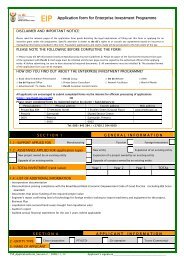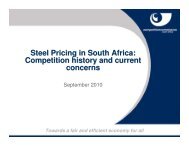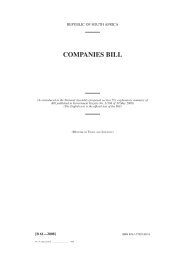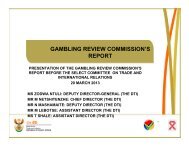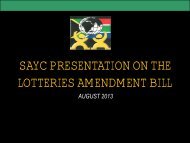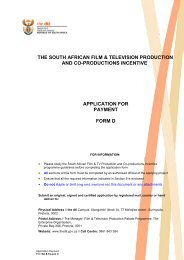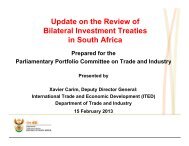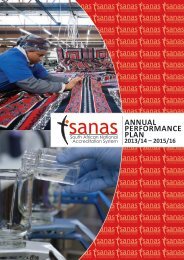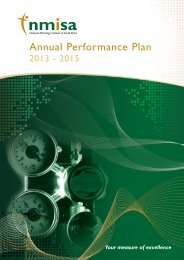Copyright Review Commission Report - ICT Law and Regulation ...
Copyright Review Commission Report - ICT Law and Regulation ...
Copyright Review Commission Report - ICT Law and Regulation ...
- No tags were found...
You also want an ePaper? Increase the reach of your titles
YUMPU automatically turns print PDFs into web optimized ePapers that Google loves.
<strong>Copyright</strong> Tribunal or an arbitrator. In the absence of agreements to the contrary, performers who haveauthorised the fixation of their performances are deemed to have granted to the persons who arranged theirrecording the exclusive right to recover their royalties (Section 5 (4) (a)).3.1.20. Although the above amendments came into operation on 25 June 2002, the Collecting Society <strong>Regulation</strong>s thatthe Minister was empowered to make under Section 39 (cA) of the <strong>Copyright</strong> Act (which had been inserted inthe Act by Act 9 of 2002) were only promulgated on 1 June 2006. In an introductory note to the regulations, itstated that there were common underst<strong>and</strong>ings during stakeholder consultations that “all rights in the copyrightregime [sc. created by Section 9A of the <strong>Copyright</strong> Act <strong>and</strong> Section 5 (3) of the Performers' Protection Act]should be managed through collecting societies in future” <strong>and</strong> that the regulations would not apply to communityradio stations. (The text of the material provisions of the regulations is to be found in Appendix 4B.) Whetherthese common underst<strong>and</strong>ings, which are not incorporated in the two Acts, have the force of law is by no meansclear.3.1.21. The regulations describe the right that a right holder has to receive a royalty, in terms of Section 9A of the<strong>Copyright</strong> Act or Section 5 (1) (b) of the Performers' Protection Act, as a ‘public playing right’. They provide (in<strong>Regulation</strong> 3) for the accreditation of persons or licensing bodies intending to act as representative collectingsocieties, language which indicates that collecting societies need not be strictly so-called. On the other h<strong>and</strong>,<strong>Regulation</strong> 5 (1) speaks of a representative collecting society being “open to all persons either directly orthrough the membership of a collective organisation representing a particular group of rights holders having asimilar interest”, <strong>and</strong> <strong>Regulation</strong> 5 (3) says that each member must have at least one vote – language whichindicates that a society properly so-called is required. <strong>Regulation</strong> 3 (1) also provides for representative collectingsocieties to administer rights to receive payments of royalties under Section 9A of the <strong>Copyright</strong> Act or Section 5(1) (b) of the Performers' Protection Act or both <strong>and</strong> for their accreditation by the Registrar. In the case of asociety having as members both the owners of copyright in sound recordings <strong>and</strong> the performers, <strong>Regulation</strong> 5(2) provides that the governing structure of the society must provide for equal representation of both classes ofmembers in the decision-making process of the highest executive organ <strong>and</strong> in the general assembly ofmembers. Also dealt with in the regulations are the powers <strong>and</strong> functions of the Registrar of <strong>Copyright</strong>(<strong>Regulation</strong> 4), the membership structure of collecting societies (<strong>Regulation</strong> 5), the administration of rights(<strong>Regulation</strong> 6), licensing (<strong>Regulation</strong> 7) <strong>and</strong> distribution (<strong>Regulation</strong> 8).3.1.22. Sub-regulation (4) of <strong>Regulation</strong> 7 provides for the approval <strong>and</strong> publication by the Registrar of a tariff acceptedby the collecting society <strong>and</strong> the trade association in question or by representative bodies or user groups. Itfurther provides that “any potential user falling within the scope of the tariff as published <strong>and</strong> complying with itsterms shall be granted a licence by the collecting society upon assuming the obligation of the payment of theroyalties established under the tariff”. Sub-regulations (5) <strong>and</strong> (6) deal with the situation where a tariff proposedby a collecting society is not accepted by the trade associations <strong>and</strong> representative bodies or the potentialusers, user groups or individual users. In that event, provides sub-regulation (5),such potential users <strong>and</strong> user groups shall have the option to pay the amount dem<strong>and</strong>ed by the collecting society intoan escrow account, pending the outcome of a referral to the <strong>Copyright</strong> Tribunal or, if the parties so agree, pending theoutcome of a referral for arbitration under the Arbitration Act, Act no. 42 of 1965, as amended. Any potential user or usergroup in respect of which a deposit is being made, <strong>and</strong> who furnishes the required information to the collecting societyto allow for the later distribution of the funds placed in escrow, shall provisionally be allowed to engage in the use that is- 18 -



